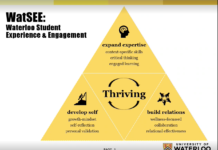There is growing evidence that good mental health correlates with good athletic performance and that mental health disorders in athletes are more common than people might expect them to be.
U Sports’ most recent National College Health Assessment Survey indicated that in 2016, 32 per cent of students were diagnosed or treated for anxiety or depression.
Dr. Carla Edwards is a former elite-level athlete who played for the Mount Allison University women’s volleyball team in the 1990s. She is an assistant clinical professor at McMaster University, president of the International Society for Sport Psychiatry and high performance mental health advisor to Swimming Canada, who now works with U Sports student-athletes to help them manage their mental health issues.
In an interview with Imprint, Edwards said mental health disorders in athletes are quite common.
“Athletes can develop the same mental health disorders as everyone else in the general population, including mood disorders (depression, bipolar disorder), anxiety disorders (including panic disorder, generalized anxiety disorder, social anxiety disorder, obsessive-compulsive disorder), ADHD, sleep disorders, alcohol and substance use disorders, trauma, personality disorders and other conditions such as low self-esteem, body image concerns, disordered eating and self-harm behaviour. It is common for many of these to coexist, including depression, anxiety and disordered eating,” Edwards said.
She noted that there is a direct relationship between good mental health in student athletes and successful athletic performances.
“Good mental health also helps to build and support healthy teammate relationships and positive behaviour in the sports environment,” Edwards said.
Edwards cautioned that issues with mental health can cause a negative impact on athletic achievement as well as create disagreements within relationships.
“[Mental health struggles] erode and create conflicts in relationships, can lead to negative behaviours in sport and an overall decline in sport performance,” Edwards said.
She also mentioned that mental health struggles can lead to decreased effort and avoidance, which further affects the overall quality of experience for the athlete in the sport.
“There is no health or performance without mental health,” Edwards said. “Just think about it — your body could be in its fittest, strongest, fastest state ever, but if you are struggling with anxiety, depression, insomnia, ADHD, disordered eating, or other mental health challenges, it would be extremely difficult to produce or maintain…success.”
Edwards pointed out that an athlete’s mental health affects every area of their life — their appetite, energy, concentration, organization, execution of tasks and responsibilities, their desire to socialize with others, motivation to succeed, their initiative, ability to complete complex tasks as well as their ability to make good decisions and cope with stress.
She also noted that student athletes have more on their plates than most athletes because of exams and other demands associated with school.
Edwards acknowledged that the culture of sport does make reaching out for help difficult for many.
She said athletes often experience the very real fear of sport-related repercussions that may result from disclosure of any mental illness and cited common fears such as being cut from a team, not getting any playing time, being judged or bullied, losing opportunities for career advancement and being treated differently as some reasons for athletes not wanting to reach out for help.
Edwards noted that only a very small handful of U Sports institutions have formal mental health support in place for athletes.
As far as future improvements go, Edwards said she believes that every university should be screening athletes for mental health disorders as recent estimates indicate that 30 to 80 per cent of student athletes will have at least one mental health disorder during their university athletic career. Additionally, every university should have an established pathway of support. If not in their own department, then a Student Wellness system with a practitioner who has a knowledge of sport.
Edwards encourages students to get help early on if they need it.
“Be aware of the resources that are available for you at your school, both within the athletics department as well as [at] student wellness on campus. It is wise to map out these resources before you actually need them, so you can more quickly line them up when needed. It’s pretty normal to have good days and bad days, and weeks that have more stress because of exams, competition, or a combination of things. If you feel down or overly anxious for several days or weeks, and it starts to get in the way of sleeping, eating and overall function, definitely reach out for help,” Edwards advised.
U Sports has also compiled a list of tips to take care of your mental health.
Connect With People Spend time with people who can inspire you. Stay in touch with family and friends. Regularly connect with them.
Be Present Stay in the moment and try not to dwell in the past or look too far ahead into the future. As a student-athlete it is easy to get overwhelmed, so take it day by day and focus on constant improvement.
Practice positive self-talk Positive self-talk is the key to both academic and athletic success! That little voice inside your head should be building you up, not knocking you down! Be kind to yourself.
Restore your brain and body. Don’t neglect your physical health. Eat a well-balanced diet and get enough sleep. Making time for sleep and relaxing allows your body to recover!
Unplug Consciously take time to unplug and put aside your technology.































